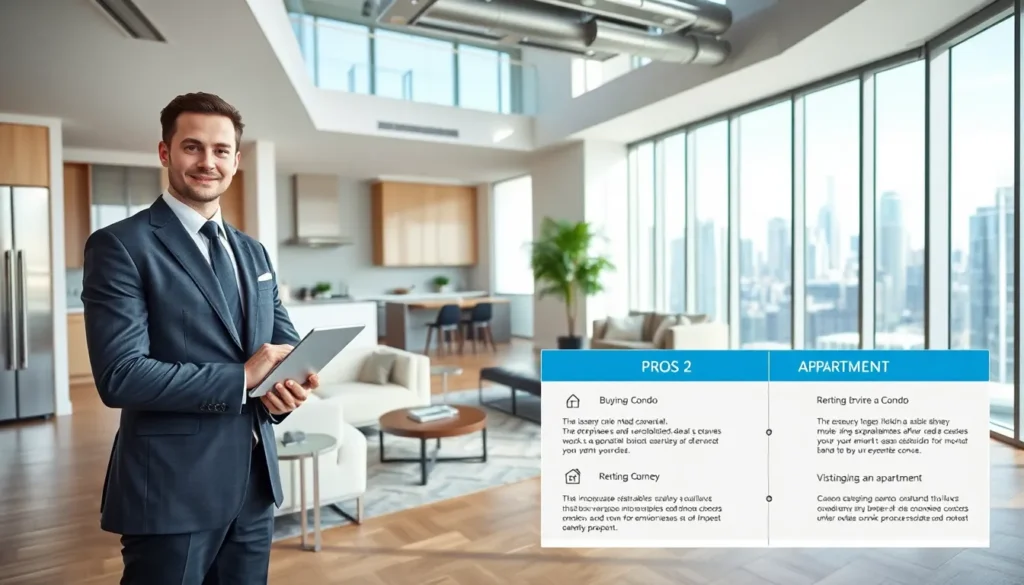Table of Contents
ToggleAre you grappling with the age-old question of buying versus renting? It’s a dilemma as perplexing as deciding between pizza or tacos for dinner. Both options have their merits, but today, we’re diving deep into the nitty-gritty of homeownership and renting to help you make the most well-informed choice. Spoiler alert: this isn’t just about dollars and cents: it’s a matter of lifestyle, stability, and investment potential. So, grab your coffee and let’s explore why one option might just have the upper hand.
Understanding The Basics

Before weighing the benefits, it’s crucial to understand the fundamental differences between buying and renting a home.
When someone opts to purchase a property, they are investing in an asset, typically acquiring a mortgage to finance their new abode. Homeownership means they have a permanent place to call their own, and hopefully, it increases in value over time.
On the flip side, renting offers more flexibility. A tenant pays a monthly fee to live in a property owned by another individual or entity, with the understanding that they can move once their lease is up. Both sides have their own sets of unique benefits and drawbacks that come into play, which we’ll explore more thoroughly in this text.
Financial Considerations
Finance plays a pivotal role in the decision to buy or rent a home. Let’s break down the costs involved.
When buying, there are initial expenses such as down payments, closing costs, and ongoing expenses like mortgage payments, property taxes, and homeowners insurance. Homeownership can become a formidable task financially, especially in the beginning. But, it’s also important to consider potential equity growth over time.
Conversely, renting generally requires first and last month’s rent along with a security deposit. These upfront costs are often significantly less than a down payment on a house. Renters also avoid long-term financial responsibilities like maintenance and property tax, which landlords typically cover.
In essence, ownership can lead to wealth built over time but may also lead to significant short-term financial strain.
Long-Term Stability
Long-term stability is a compelling aspect of buying versus renting that many overlook. Homeowners often find considerable peace of mind, knowing they have a steady place to live, shielded from the fluctuations of the rental market.
Once you own a home, your mortgage payment generally remains constant, unlike rent, which can spike based on market conditions. This stability allows homeowners to plan for their future confidently. Also, owning can provide a sense of belonging to a community, a feeling that decides the emotional aspect of a home.
Personal Freedom And Control
Personal freedom is another crucial factor swaying individuals toward buying rather than renting. Owning a home means freedom to modify, renovate, and customize your space. Want a bright pink door or an extravagant garden? Go for it.
Renters, on the other hand, often must abide by their landlord’s rules, which can limit their creativity and ability to truly make a space their own. From paint colors to appliance upgrades, renters frequently find themselves, well, renting with restrictions. The freedom to make a house a home is a unique privilege reserved for homeowners.
Investment Potential
Buying a home often presents a substantial investment opportunity, unlike renting. Real estate tends to appreciate over time, and homeowners can cash in on that when it’s time to sell. In many cases, buying property can be one of the best long-term investments an individual can make.
In contrast, monthly rent payments represent costs without any potential return. When the lease ends, there’s no cash gained from just living in a property. Comparing buying a house with stocks or mutual funds highlights homeownership as a potentially safer investment, providing both financial and emotional returns.
Flexibility And Lifestyle Choices
While buying a property has numerous advantages, renting shines when it comes to flexibility. Individuals who anticipate relocating for work or personal reasons often find renting a far more practical option.
With renting, there’s no lengthy commitment. Leases can range from a few months to a couple of years, allowing those in transitional phases of life to explore new places without being tied down. This flexibility can be appealing to young professionals or families who hope to figure out where they want to settle down long-term.




